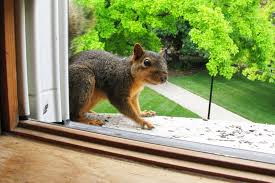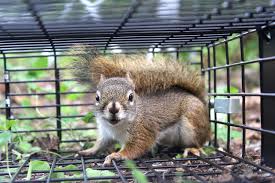Why Should Squirrels Be Treated?
When squirrels enter a loft space, they can cause structural damage by tearing up loft insulation for bedding, chewing timbers, pipe work and stored items, and posing a fire hazard by stripping insulation from electrical wiring and/or chewing through cabling which can cause fires or electrical problems. Insulation may be pilled into large balls for the nest or drey. They may also be very noisy, and if they drown in uncovered water storage tanks, may contaminate the water supply. For these reasons, it is important to keep squirrels out of lofts. Squirrels in gardens are also destructive pests, eating plants, bulbs, stripping bark and will eat bird’s eggs and chicks. Grey Squirrels are classed as vermin. It is illegal to release a trapped Grey Squirrel.
Preparation Prior To Treatment
Don’t attempt to block any entry holes prior to treatment. If you do this they may cause further damage trying to get back into their ‘home’.
Treatment
The treatment of a Squirrel infestation is much more difficult & time consuming than the other rodent pests. Control of Squirrels in outside areas can be carried out in some circumstances but needs to be carefully considered as once a family of squirrels has been removed from an area that territory will be re occupied sooner or later. How soon this happens depends on the population of the surrounding area. They will prey on birds nests, eating eggs & young. Feeding squirrels in gardens will increase the density of the population possibly harming other wildlife. To control them we will use trapping & poisoning. The technician will use traps that kill the squirrels. Legally these types of traps have to be checked daily so can only be used if you are able to do so. If you see or hear an animal caught in one of the traps that is in distress you must phone our office.

Signs Of Squirrels In Your Home Or Business
Our figures suggest people have more problems with squirrels during the spring and autumn when they’re looking for food.
These are the seven signs easiest signs to spot when looking for evidence of squirrels in your home or loft.
- Scratching and rustling sound from your loft or a wall cavity
- Spotting droppings in the loft – although you might need a pest controller to identify these droppings
- Smell of urine in the loft area might indicate the infestation has been going on some time
- Spotting lots of other squirrels around your property, particularly near your roof or on high fences
- Fruit and nuts being stolen from bird feeders, or the feeders being disturbed/knocked over
- Bark being stripped from trees in your garden
- Holes in vents or damage to your insulation foam.

Combination of Traps, Baits, and Repellents
Use a combination of traps, bait boxes, and two different repellents in the same pattern as numbers one and two above, but alternate the traps and bait boxes at random. Sun Tzu, in his seminal work, The Art of War, advises us to know our enemy, in this case, squirrels.
Their natural inquisitiveness will lead them to investigate each time a trap turns up where a bait box used to be and vice versa. Alternating liquid repellents will further confuse the squirrels, increasing the chances of them being funneled into the areas where you’ve set your traps and bait boxes.
An All Repellent Method
An all-repellent option, this one uses the ultrasonic spikes together with multiple liquid repellents to drive the squirrels away from your hard and garden.
The spikes have to stay where you place them. Just make sure that none of them are on the same tempo or beat, thus you always have one or more them sounding while others are quiet.
Spray the repellents around all the trees and poles in the yard as well as around the spikes. Squirrels will sometimes investigate the source of the irritating noise in an attempt to stop it.
Liquid repellents will aid in keeping them away, reinforcing their perception that something bad is taking place and they should head for greener pastures somewhere else.

Squirrel Control Recommendations
- Removal of any diet source: bird seed for example, because they attract the squirrels is the first order of business.
- Using gutter guards and covering downspouts will reduce the number of squirrels that are entering through the rooftop and facia boards.
- Live trapping method of trapping squirrels is the only way to remove unwanted squirrels. Catching a squirrel is really the only way to get rid of squirrels in your attic, once they have chewed holes. It is important to seal up and repair all entry points after trapping the squirrels, so they no longer have access.
- Locate the trap along the path of entry and places of known foraging activity.
- Go about 4-5 miles away to relocate the squirrels, or it will find its way back to your area.
- You may want to consider local ordinances for trapping squirrels, in that they differ. Sometimes a professional trapper with a nuisance control license is needed to not only capture the squirrel but relocate it as well.
How To Get Rid Squirrels In The Attic
The following recommendations combine advice, rules, and tips to hasten the elimination of squirrels from the attic:
- Take away foodstuff, the smell is likely to attract squirrels. Clean the attic from everything that can be used for nesting: paper, old wallpaper, wool things, etc.
- Place your pets’ hairs around the attic. The permanent feeling of an enemy will frighten the pests.
- Dampen cotton cloths in ammonia and place them wherever squirrels can gather. The sharp smell will drive the animals away. After your tattle tails disappear, switch on a ventilator or air ionizer (purifier) to clean the air.
- Place around the attic small cotton balls or pieces of fabric dampened in naphthalene: near boxes, in corners, wherever else you’ve seen rodent activity. To increase the repelling impact, combine it with other types of rodent-repelling substances or essential oils. But be careful: naphthalene is highly flammable and classified as a dangerous fire hazard.